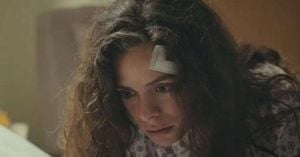SAS Rogue Heroes, the critically acclaimed BBC series returning for its second season, is generating heated discussions among fans following its recent airing on New Year's Day. Adapted from Ben Macintyre's best-selling book, the show, created by Steven Knight of Peaky Blinders fame, chronicles the formative years of the SAS during World War II. Despite its engaging portrayal of historical events, viewers have expressed mixed feelings about the new plotlines and character developments.
Returning cast members Jack O’Connell, 34, Sofia Boutella, 42, and Connor Swindells join the series, with O’Connell portraying the rebellious Paddy Mayne. This season sees Mayne stepping up as the new leader of the regiment after former commander David Stirling, played by Swindells, is captured during battle. The narrative expansion introduces fans to fresh dynamics as Mayne and Stirling grapple with the SAS's identity and relevance amid wartime challenges.
Though anticipated, the show has drawn criticism for straying too far from its predecessor's success. Some viewers have characterized the plotlines as "absolutely stupid," with complaints spotlighting new additions like the character of Eve Mansour, portrayed by Boutella. Her storyline—a romantic subplot involving Stirling depicted through visits from the Italian nun who is secretly British intelligence—left many scratching their heads. One viewer tweeted, "Oh look. An undercover nun. Does SAS mean Story Absolutely Stupid? #SASRogueHeroes," encapsulating the sentiment among perturbed audience members.
Despite some frustrations, the inclusion of female characters like Mansour has opened up dialogue on gender representation during wartime narratives. While her character is fictional, Boutella’s role seeks to honor the contributions of real women who played significant, albeit less documented roles during WWII. Knight elaborates, stating, "the true story of the SAS is drama beyond what fiction can invent. The characters are beyond belief but, for the most part, they're real." This serves as both creative license and homage to the unsung operatives of the era.
Alongside character critique, the show has also attracted attention for its portrayals of accents. Viewers have taken to X to express confusion over O’Connell’s Northern Irish accent, bringing attention to its accuracy—or lack thereof. Comments flooded social media, with one user noting, “I’d hoped Jack O'Connell would have worked on his North Down accent. Maybe spend some time in Newtownards. Seems not... #SASRogueHeroes.” Further complaints claimed the accent felt disconnected from the character's roots, labeling it as both distracting and disappointing.
Nonetheless, not all feedback has been negative. Some fans have praised the show for its high-stakes storytelling and engaging action. “Delivering again. Absolutely love what Steven Knight has done with this,” posted another viewer. It appears the series continues to resonate with portions of its audience, reflecting strong storytelling intertwined with authentic wartime tension.
The production aspect of SAS Rogue Heroes remains noteworthy, with scenes filmed across various locations, including the historic HMS Cavalier at The Historic Dockyard, Chatham—a point of local pride. The dockyard and nearby Fort Amherst have served as backdrops for numerous productions, enhancing the show’s authenticity with visually compelling settings. Featuring historical structures originally built to stave off Napoleonic attacks, these locations deliver both charm and depth to the series. Knight’s commitment to capturing the essence of the war, combined with stunning visuals, continues to set the bar high for historical dramas.
While the second series introduces elements divergent from its predecessor, the creators maintain the show is not solely about historical accuracy. Knight emphasizes this point by openly stating, “this is NOT a history lesson,” acknowledging the series’ markers of creative freedom. This approach allows dramatization without strict adherence to historical fact, creating space for invented interactions and narratives—an artistic choice reflective of the drama genre.
At the heart of this artistic expression is the portrayal of women, alongside Boutella’s role, which has raised eyebrows among critics and fans alike. The introduction of female characters has led to discussions on the historical representation of women during wartime. While some see this as merely pandering to modern sensibilities, others argue it enriches the narrative by presenting complex characters who symbolize the courage of past female operatives, regardless of their direct historical validation.
With the season having aired just weeks ago, it's clear SAS Rogue Heroes is sparking conversation—both praise and criticism—over its ambitious storytelling choices. Although it has provoked skepticism about certain elements and character portrayals, the show's continuing capacity to engage viewers speaks to its strength as both entertainment and commentary on the historical narratives it seeks to explore. Viewers are invited to tune in as the season evolves, with the hope the initial hiccups could lead to more compelling story arcs and character developments as the series progresses.
Fans will be eagerly watching the upcoming episodes on BBC One to see whether the series can redeem itself and strike the right balance between storytelling liberties and historical fidelity. SAS Rogue Heroes remains available for streaming on iPlayer, where audiences can catch up on the dramatic and often controversial second chapter of this thrilling saga.



